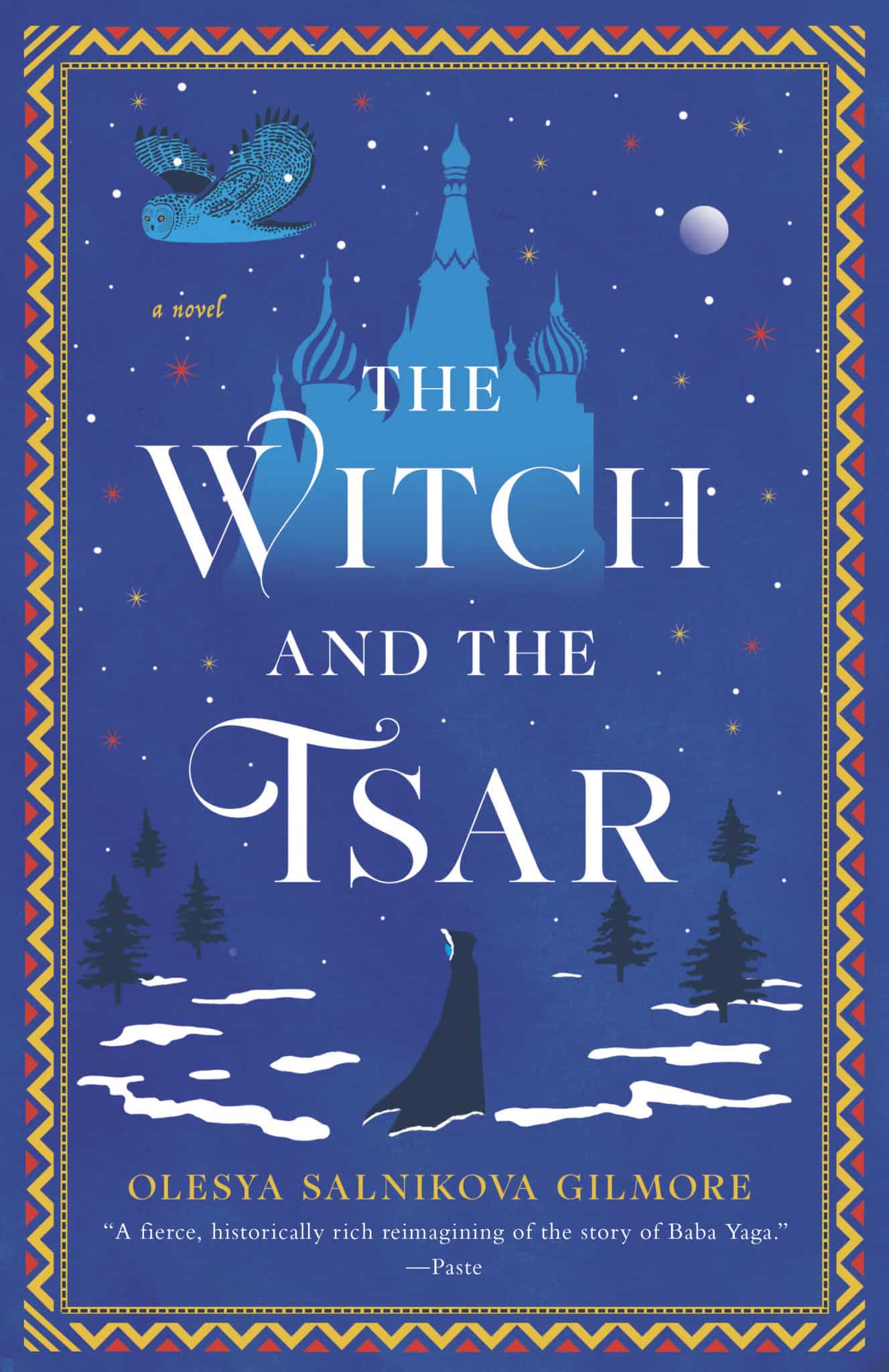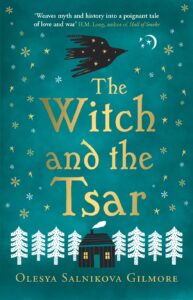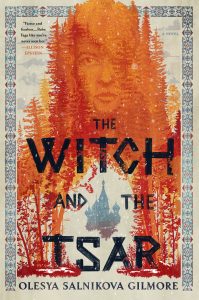Now in Paperback
US Hardcover Version
About the Book
- Named in Library Journal’s List of Best SF/Fantasy of 2022
- Nominated for The Fantasy Hive’s Year-End Awards for 2022 in the Debut of the Year, Standout Standalone, Hidden Gem, and Best Fantasy Creature Categories
As a half goddess possessing magic, Yaga is used to living on her own, her prior entanglements with mortals having led to heartbreak. She mostly keeps to her hut in the woods, where those in need of healing seek her out, even as they spread rumors about her supposed cruelty and wicked spells. But when her old friend Anastasia—now the wife of the tsar, and suffering from a mysterious illness—arrives in her forest desperate for her protection, Yaga realizes the fate of all of Russia is tied to Anastasia’s. Yaga must step out of the shadows to protect the land she loves.
As she travels to Moscow, Yaga witnesses a sixteenth-century Russia on the brink of chaos. Tsar Ivan—soon to become Ivan the Terrible—grows more volatile and tyrannical by the day, and Yaga believes the tsaritsa is being poisoned by an unknown enemy. But what Yaga cannot know is that Ivan is being manipulated by powers far older and more fearsome than anyone can imagine.
Olesya Salnikova Gilmore weaves a rich tapestry of mythology and Russian history, reclaiming and reinventing the infamous Baba Yaga, and brings to life a vibrant and tumultuous Russia, where old gods and new tyrants vie for power. This fierce and compelling novel draws from timeless lore to create a heroine for the modern day, fighting to save her country and those she loves while also finding her true purpose as a goddess, a witch, and a woman.
Buy the Book
Paperback
Amazon | Barnes & Noble | Books-A-Million | Bookshop
Hardcover
Amazon | Barnes & Noble | Books-A-Million | Bookshop
eBook
Apple Books | Google Play | Kindle | Kobo | Nook
Audiobook
Apple Books | Audible | Google Play | Kobo | Libro.fm | Nook
“Gilmore impresses with this feminist retelling of the Baba Yaga folktale set in 16th-century Russia…Gilmore’s immersive prose steeps readers in this wonderfully epic folktale full of magic and myth.”
—Library Journal (Starred Review)
“A rich and well-woven story centered on subverted folklore played out against the backdrop of historical events. The Witch and the Tsar is not to be missed.”
—Booklist
“Gilmore’s enchanting debut adds to the growing genre of mythological retellings that reframe the acts of supposedly villainous women…this epic tale brings both history and folklore to vivid life. It’s a fresh, exciting take sure to capture fans of Madeline Miller’s Circe and Jennifer Saint’s Ariadne.”
—Publishers Weekly
“A fierce, historically rich reimagining of the story of Baba Yaga…full of complicated, three-dimensional women.”
—Paste Magazine
“A fantastically spun tale like nothing you’ve ever read before.”
—Buzzfeed
“The novel is about as ideal a crossover between the genres that it’s possible to achieve, with vivid details on colorful period clothing, palace décor, and the brooding taiga as well as otherworldly rituals and capricious divine beings. Though packed with bursts of action, the story is quite thoughtful and paced accordingly.”
—Historical Novel Society
“No longer the ugly hag, Gilmore reimagined Yaga as a powerful feminist heroine and a symbol against tyranny and corruption. As a historical fiction, Gilmore gives an in-depth look in to the reign of Tsar Ivan IV. Her book is a beautiful combination of pre-Christian mythology and historical figures from mid-1500s Russia. Readers looking to discover a new Baba Yaga will enjoy The Witch and the Tsar.”
—Manhattan Book Review (5-star review)
“The Witch and the Tsar does for Baba Yaga what Gregory Maguire’s ‘Wicked’ did for the Wicked Witch of the West, telling of how an immortal half-divine healer, read with earnest verve by Katia Kapustin, is demonized into her familiar ghastly shape through the rising intolerance of the Christian church in 16th-century Russia.”
—The Seattle Times
“This beautiful retelling of a Slavic fairy tale will give you food for thought as myth and history delicate weave around each other.”
—Belfast Telegraph
“Weaves a magical spell.”
—Heat Magazine
“This is a feminist retelling of Yaga, deconstructing the conventional stories around the figure and exposing the ostracised wise woman behind them. Gilmore sets out to do for Baba Yaga what Miller did for Circe, Saint for Ariadne, North for Penelope…and achieves it beautifully…[A] rich and heady blend of historical fiction and mythological retelling.”
—The Fantasy Hive
“Brisk as the winter wind, Katia Kapustin manifests the witch Yaga with a surprisingly youthful timbre, as befits this reinterpretation of the famed Slavic folklore villain Baba Yaga. Here Yaga is a young heroine who is half goddess, rather than a deformed, ferocious old woman. Kapustin’s precise enunciation of tricky Russian names and places draws the listener into the harsh and alluring landscape of sixteenth-century Moscow…At the end of the story, author Olesya Salnikova Gilmore narrates a discussion of her motivations for this feminist refashioning…[which is an] enriching setting of the stage.”
—AudioFile Magazine
“The Witch and the Tsar is Olesya Salnikova Gilmore’s intriguing debut. It is a well-written and compelling story, focused on atmosphere. And that makes The Witch and the Tsar a perfect read for this time of year.”
—Grimdark Magazine
“This was an engaging, violent, and emotional story that kept me engaged. Those that enjoy reimagined folk tales and mythology may want to consider this book as their next read.”
—Mystery & Suspense Magazine
“A rich and vivid tapestry of old Russia in an age when Tsar Ivan the Terrible grappled not only with political foes but with the legendary witch Baba Yaga and her command of magic and pagan gods. An evocative journey into old Russian myth and history, and a poignant exploration of what it means to be both human and immortal.”
—Margaret George, New York Times bestselling author of The Splendor Before the Dark
“A delicate weaving of myth and history, The Witch and the Tsar breathes new life into stories you think you know.”
—Hannah Whitten, New York Times bestselling author of For the Wolf
“The Witch and the Tsar delivers high stakes, memorable characters, and a sixteenth-century Russia you can almost reach out and touch. Yaga’s tale is a story I never knew I needed.”
—Genevieve Gornichec, National bestselling author of The Witch’s Heart
“In The Witch and the Tsar, Baba Yaga is transformed by the magic of Olesya Salnikova Gilmore’s prose from a shadowy figure into a breathing woman with a beating heart… A powerful and moving debut.”
—Molly Greeley, Author of The Heiress
“A perfect blend of fantasy and historical fiction, The Witch and the Tsar magnificently paints an old Russia full of vengeful gods, court intrigue and high adventure. In the center of it all is the half-goddess Yaga, isolated and proud, whose compassion for humanity drives her into a war with Ivan the Terrible and the mythical beings who use him for their own ends. Immersive and beautifully written, Yaga’s story reminds us that gods—like humans—can choose their own fates.”
—Anika Scott, international bestselling author of The Soviet Sisters
“Weaves myth and history into a poignant tale of love and war and gods in the flesh, with impeccable imagery and a heroine whose strength and courage stayed with me long after the final page. Fans of The Witch’s Heart, Circe and The Bear and the Nightingale are sure to fall in love with Gilmore’s compelling debut.”
—H.M. Long, Author of Hall of Smoke
“Fierce and fearless, The Witch and the Tsar whisks the reader back to a 16th-century Russia that’s enthralling, frightening, and completely unforgettable. With stunning prose and sharp insight, Olesya Salnikova Gilmore conjures up a captivating battle between gods, emperors, and folkloric spirits, led by a prickly, powerful heroine who leaps off the page and refuses to be ignored. This is Baba Yaga like you’ve never seen her before, and you’re going to love her.”
—Allison Epstein, Author of A Tip for the Hangman
“Beautifully written, gripping…a story of Baba Yaga as you have never met her before—don’t even THINK about missing it!”
—Gabriella Saab, Author of The Last Checkmate
“An utterly enchanting, wholly immersive debut that deftly reimagines the legend of Baba Yaga. This one is unmissable.”
—Alexis Henderson, Author of The Year of the Witching
“Russia’s fascinating myths and violent history swirl like ingredients in a magic potion in The Witch and the Tsar, with enchanting results. A vivid, immersive dream of a story.”
—Sarah Porter, Author of Vassa in the Night
“Expertly drawing from Russian history and mythology, Olesya Salnikova Gilmore transforms Baba Yaga into a complex heroine, whose quest to save her country sparkles with folk magic and supernatural intrigue. A powerful, original story.”
—Mary McMyne, Author of The Book of Gothel
Olesya reads the first chapter:
Watch a Video on YouTube
The Witch and the Tsar cover reveal and excerpt in Paste Magazine
The Witch and the Tsar
Late May 1560
When my owl landed on my shoulder, I knew that heartbreak was not far behind.
It was not that twilight tasted differently, though on my tongue, the humid spring air had the bitterness of snowfall. It was that, even this deep in the Russian forest, dusk bled into the light with infuriating leisure. The clouds had smothered the last of the sun’s rays in scarlet. Yet day clung on, delaying what mortals intended to find their way to my izbushka.
The log hut stood on chicken legs, not swaying or spinning or even pacing, as unnaturally still as me. I usually fidgeted with impatience, eager for my first client to appear, for my work to begin. Now, unease wrapped around my throat, silent as a viper.
My owl could only be here to deliver bad tidings. Like her namesake, night, Noch came in the company of darkness and shadows. It was then the mortals arrived with their fevers, skin infections, and stomach poisons; with the burns from the fires that spread too quickly in their cramped, wooden villages. They did not approach me in the light of day, even if it was waning. Not unless they brought disaster.
Noch’s bright yellow gaze fixed on me pointedly. She let out a screech loud enough to reanimate the skulls on the fence encircling my izbushka.
They are here, Ya. Her voice, in the language she spoke, reverberated through my mind, becoming words I could understand.
“Already?” I asked in Russian. Someone was coming. Someone desperate enough to risk being seen. “Who is it?”
What am I, your servant? You will see. A downy wing brushed against my cheek teasingly as Noch ascended into the air. But instead of hurling herself back into the sky, she flew into my hut through the open door, shedding several dove-gray feathers in her wake.
I picked up a feather, considering it. My owl never went inside of her own volition, valuing open sky and freedom above all. I strained my ears and waited for the first footfall. All I heard was the song of the crickets and the leaves, rippling in the breeze that had rushed toward me, insistent and oddly cold. Fluff drifted from the ancient cottonwood trees, settling onto the wooden steps of my hut like tufts of snow. And I had just cleaned them.
“Come down, Little Hen,” I said to my izbushka, and she obeyed, folding the chicken legs beneath her so she looked almost like a regular house.
I tightened my hold on the broom and swept at the steps with renewed vigor. The hut jerked away, being unbelievably ticklish. The two windows on either side of the door glowered at me, their red and blue carving brightening in indignation.
“Hold still, Little Hen,” I said and swept on. But I kept a close eye on the wood beyond the skulls.
My hut sat in a lush glade surrounded by towering, age-old trees. Overgrown pines and spruces jostled against starved yet stubbornly resilient birches. The oaks stood gravely, expansively, ready to pass on their energy to anyone who asked politely. The wispy grass had grown knee-high and tangled, the forest floor ripe with mushrooms, wild strawberries, and violet petals fallen from geraniums in bloom. Out of this chaos of living things a large man stepped out, all in black, face obscured by a wide-brimmed hat.
I stilled. “Who goes there?”
The man halted at the fence, no doubt trying to decide if the skulls there were human. “Is this the izbushka of Baba Yaga the Bony Leg?”
With my unease temporarily forgotten, my cheeks flushed with familiar indignation. Not many dared to say that name to my face. “It is the izbushka of Yaga.”
Fool, I almost added. Do I look like a baba? I was not a babushka, lying on my stove in the throes of advanced age and infirmity. Nor was I a hag, a demon, or an illness. Nothing about me was ill or demonic or old, except the occasional thread of silver in my wild black hair. My father may have been mortal, but Mother had been a goddess since before the Christian God had come to Russia. Because of her immortality, my body had not aged past thirty after centuries on Earth. I sent a little prayer of thanks up to her.
The man stood motionless. His features were weathered and very plain, most covered in coarse black hair, as was the fashion. No outward ailment spelled disaster. His illness, though, could be of the internal or spiritual variety, even of a romantic one.
Either way, it was best to put him at ease, as was my practice with new clients. Those who came for succor found it in my hut. Healing filled the empty hours of my days, kept my hands occupied and my mind busy, gave me a sense of purpose. If I could have lived among mortals, healing and advising them, I would.
But the legend that clung to me—the legend of Baba Yaga, built on lies and ill will, prevented it.
Excerpted from THE WITCH AND THE TSAR by Olesya Salnikova Gilmore, published by Berkley, an imprint of Penguin Publishing Group, a division of Penguin Random House, LLC. Copyright © 2022
Recorded Events
Thursday, August 4, 2022
Q&A plus Virtual Reading with Mary McMyne (The Book of Gothel)
Malaprop’s Bookstore Presents “Reclaiming the Witch”
Watch a Video on YouTube
- Strong language
- Strong violence/gore
- Corpses and mass murder
- Murder (including children and animals, though neither is witnessed by the reader)
- Death, including a funeral (witnessed by the reader)
- Scenes of war and battle, including violence thereof
- Physical and psychological abuse/torture (mention of, after-effects witnessed by reader in a few scenes, but not many)
- Illness (witnessed by the reader)
- Arrest and imprisonment
- Poisoning (witnessed by the reader)
- Arson (witnessed by the reader)
- Blood sacrifice and ritual
- Hypothermia
- PTSD following war (witnessed by the reader)
- Brief mention of rape, as well as sexual coercion
- Sexism
- Pregnancy, birth (a few scenes, not graphic)
- Sex (one scene, not graphic)
- Drinking/intoxication (
witnessed by the reader)


